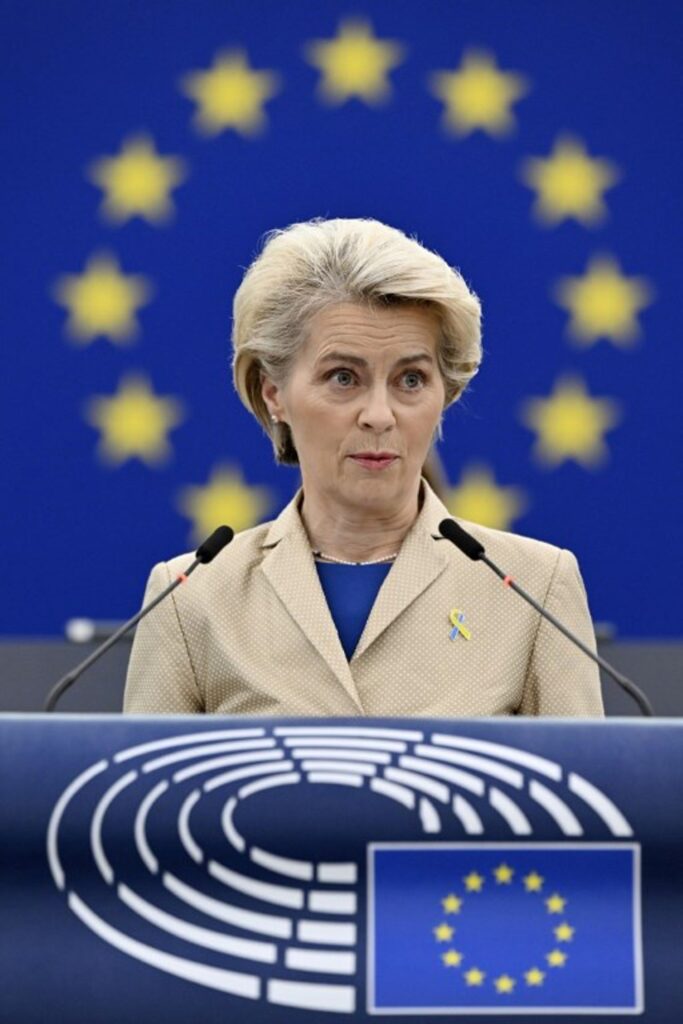The EU should include Iran's drone operators in its 10th package of sanctions against Russia for supplying drones to Moscow, European Commission President Ursula Von der Leyen stressed on Wednesday morning in Strasbourg.
Ms. Von der Leyen was speaking at a plenary session of the European Parliament during a debate on the first anniversary of the Russian invasion of Ukraine on 24 February 2022.
Hundreds of Iranian-made drones used by Russia on the battlefields in Ukraine are killing Ukrainian civilians, she said. For the first time ever, the Commission is proposing to sanction Iranian operators, including those linked to the Revolutionary Guards, she added, noting that it was Europe's duty to sanction them and to confront Iran about the supply of drones and the sharing of know-how to make drones in Russia.
Commission proposes to slap export bans totalling over €11 billion on Russia
Adopting international sanctions is the purview of the European Council. The European Commission has prepared a proposal for a “10th package” of sanctions related to the war in Ukraine, which it hopes will be adopted on the anniversary of the start of the invasion, on 24 February.
This package will include new trade bans and restrictions on technology exports to Russia.
In a statement to the press alongside EU diplomatic chief Josep Borrell, the European Commission president gave further details of the institution's proposal, including new export bans totalling “more than €11 billion.”
The sanctions would target many "industrial products that Russia needs and that cannot be supplied by third countries," she said, including essential goods such as electronics, specialised vehicles, machine parts, spare parts for trucks and jet engines, along with products from the construction sector that may be destined for the Russian military, such as antennas or cranes.
Seven Iranian entities targeted
Additional restrictions on technological products and dual-use goods will target “electronic components that can be used in Russian weapons systems, including drones, missiles and helicopters.”
The Commission wants to prevent Moscow from obtaining them from elsewhere. To this end, it will include entities from third countries in the dual-use sanctions, including “seven Iranian entities,” said Ms. von der Leyen. “They are now subject to a total ban on selling sensitive items to Russia. And we are ready to list other Iranian entities and other third countries that supply sensitive technology to Russia," she added.
The Commission is further proposing to add “almost 100” names to the list of individuals and entities subject to restrictive measures for their involvement in actions “undermining or threatening the territorial integrity, sovereignty and independence of Ukraine,” Josep Borrell noted.
This includes people and media outlets held responsible for the propaganda and disinformation put out by the Kremlin, he said, but also political or judicial officials acting on behalf of Russia in the annexed territories.
No mention of diamonds
One element that Belgium is particularly watching is not mentioned in the speech: the possibility of touching Russian diamond imports. Flemish socialist Kathleen Van Brempt (Vooruit) regrets this. “It is incomprehensible that there is still no import ban or sanctions against Alrosa or its CEO,” she said on Wednesday, referring to a trade that brings in “four billion dollars annually” to Moscow.
According to Van Brempt, Antwerp imported nearly €1.2 billion worth of Russian diamonds last year. There has been a drop since the war in Ukraine, but there has been a certain increase again at the beginning of the year, she said. While the idea, defended by Belgium, of favouring a system of traceability of diamonds, on a wider scale than just European, is a good one, such agreements can “in no way replace sanctions at European level,” she believes.
The European Commission is also proposing to set up a European diamond monitoring system.

